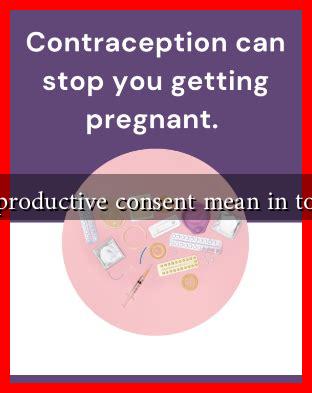-
Table of Contents
What Does Reproductive Consent Mean in Today’s Society?
Reproductive consent is a critical concept that encompasses the rights and autonomy of individuals regarding their reproductive health and choices. In today’s society, where discussions around gender equality, bodily autonomy, and reproductive rights are increasingly prominent, understanding reproductive consent is more important than ever. This article explores the meaning of reproductive consent, its implications, and the challenges faced in ensuring it is respected and upheld.
Defining Reproductive Consent
Reproductive consent refers to the voluntary agreement of individuals to engage in reproductive activities, including but not limited to sexual intercourse, contraception use, pregnancy, and abortion. It is rooted in the principles of autonomy and informed decision-making, ensuring that individuals have the right to make choices about their bodies without coercion or manipulation.
The Importance of Informed Consent
Informed consent is a fundamental aspect of reproductive consent. It requires that individuals are provided with all necessary information regarding the potential risks, benefits, and alternatives related to reproductive choices. This includes:
- Understanding the implications of using contraceptives.
- Awareness of the risks associated with pregnancy and childbirth.
- Knowledge of available options for abortion and their consequences.
For instance, a study published in the journal *Contraception* found that many women reported feeling uninformed about their contraceptive options, leading to unintended pregnancies. This highlights the need for comprehensive sexual education and access to healthcare resources that empower individuals to make informed choices.
Legal and Ethical Dimensions
Reproductive consent is not only a personal issue but also a legal and ethical one. Various laws and regulations govern reproductive rights, and these can vary significantly across different regions. For example:
- In some countries, laws mandate parental consent for minors seeking reproductive health services.
- In others, restrictive abortion laws can undermine a woman’s right to make decisions about her own body.
- Recent legal battles in the United States, such as the overturning of *Roe v. Wade*, have reignited debates about reproductive consent and autonomy.
These legal frameworks can either support or hinder reproductive consent, making it essential for individuals to be aware of their rights and the laws that govern them. Organizations like the Guttmacher Institute provide valuable resources and data on reproductive health policies worldwide, helping individuals navigate these complex issues.
Challenges to Reproductive Consent
Despite the progress made in recognizing reproductive rights, several challenges persist in ensuring reproductive consent is respected:
- Coercion and Manipulation: In some relationships, individuals may face pressure to engage in reproductive activities against their will, undermining their autonomy.
- Access to Information: Many individuals lack access to comprehensive sexual education and healthcare services, limiting their ability to make informed choices.
- Societal Stigma: Cultural and societal norms can create barriers to open discussions about reproductive health, leading to misinformation and fear.
Addressing these challenges requires a multifaceted approach, including education, advocacy, and policy reform to create an environment where reproductive consent is not only recognized but actively upheld.
Case Studies and Real-World Examples
Several case studies illustrate the complexities surrounding reproductive consent:
- The Case of Planned Parenthood: In the U.S., Planned Parenthood has been at the forefront of providing reproductive health services and education, advocating for informed consent and access to care.
- International Perspectives: In countries like India, initiatives aimed at improving women’s access to reproductive health services have shown positive outcomes in empowering women to make informed choices.
These examples underscore the importance of organizations and policies that prioritize reproductive consent and the need for ongoing advocacy to protect these rights.
Conclusion
Reproductive consent is a vital aspect of individual autonomy and rights in today’s society. It encompasses informed decision-making, legal protections, and the ethical considerations surrounding reproductive health. As we navigate the complexities of reproductive rights, it is crucial to address the challenges that hinder individuals from exercising their consent fully. By promoting education, advocacy, and supportive policies, we can create a society where reproductive consent is respected and upheld, empowering individuals to make choices about their bodies and futures.
For more information on reproductive rights and consent, visit Guttmacher Institute.


